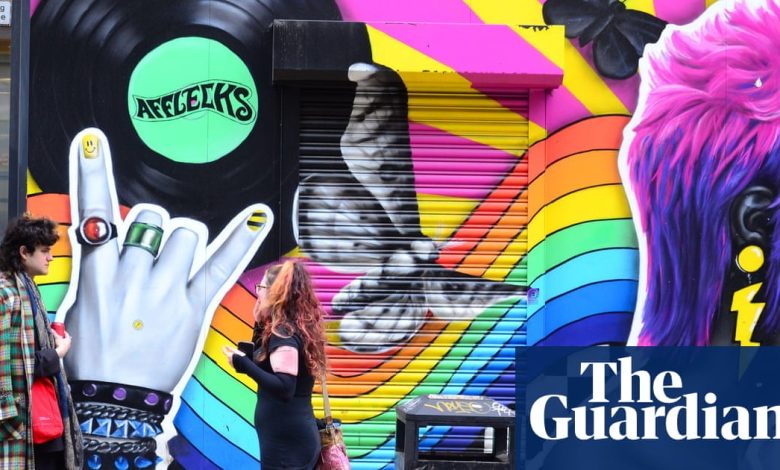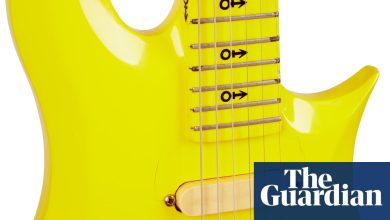A trail of two cities: an alternative guide to Salford and Manchester | Manchester holidays

[ad_1]
Oon the first Sunday in May each year, Chapel Street, where Manchester city center and Salford meet, comes alive with art, music and a DIY show Sounds from the other city festival. It’s a lively public celebration of the “spirit of community and collaboration” that co-director Emma Thompson says underpins much of the region’s alternative culture.
“Collaboration is at the heart of what we do, of Greater Manchester as a city,” says Thompson. “People come together and it crosses genres and art forms. Sounds from Another City wouldn’t be 20 next year if it weren’t for that. The fees we offer are not huge, but people really get behind it, they do it for love.”
Thompson is candid about the challenges facing those who make experimental art: “It’s uncertain. It feels unstable.” Costs are high, available space is scarce, funding is “very competitive.” Such forces change the creative landscape, literally. of Manchester Northern Quarter it still has its quirkier, artsy spots, but casual bars and restaurants predominate. Leftfield culture is migrating to the outskirts of the city – or into Salford.
For the past 18 months, the group WH lung are based at Salford’s Islington Mill, a complex of artists’ studios. Keyboardist Tom Sharkett says that at a time when in many ways you “have to be crazy” to pursue a life in music and art, it’s inspiring to be surrounded by people “doing great things for the right reasons.”
Opened in 2000, Islington Mill has recently expanded into new buildings, including an adjacent shopping complex. “The mill feels like it’s taking on a new life. It feels strong,” says Sharket. This also applies to wider Manchester and the creative energy of Salford. The obstacles are many, but the drive to make great art endures.
Music and nightlife
Manchester music is arguably as vibrant right now as it has been at any post-punk moment – from Anz to Space Afrika, Blackhaine to Sockethead, Mandy, Indiana to Michael J Blood. Much of this is due to the nurturing influence of The White Hotel, a former garage near Strangeways Prison. In contrast to the boring gentrification of modern Manchester, this unique whole (dark location, great sound, art school ethos, all-night rave energy) created a space for new music to develop. “It’s a really important space,” says Thompson.
In the Northern Quarter, but in similar creative territory, a club and concert venue Soup proves that all you need is a basement, a red light and, in addition to feeling, a program that challenges its audience.
Other downtown venues that defy convention include punk and indie heaven Star and Garter, Aatma, Peer’s hat and Peste (see drinks section below). But interesting things are increasingly happening outside the center, often in unexpected places.
Two of Manchester’s vital mass venues – the The Old Abbey Taphouse, at a science park in Hulme, south of the city centre; and DBA on Cheetham Hill to the north – are historic pubs that now double as clubs and music venues. “Standing outside the DBA,” Sharkett says of this traditional Victorian boozer, “you’d have no idea what was going on.” He once took on veteran Glaswegian DJs Optimo: “They’ve seen it all, but they loved it.”
In these relatively obscure corners, music is encouraged to get weird: in the warehouse Hidden; of Salford Eagle Inn; musically out N/OM; The yard; and partisan at Islington Mill. Accessible, inclusive and home to a “huge array” of LGBTQ+ events, the Partisan collective is one of the most exciting venues in the city, according to Thompson. “It is a glorious place.”
Art and culture
Aged 24 years young, Salford’s Islington Mill remains a major creative center. Its public events are run by Partisan, which hosts club nights, exhibitions, discussion groups and creative workshops, and a ‘radioactive queer bar’ Mirage. This bar-gallery-event space is home to genre-fluid evenings of art, performance and experimental music, from outfits including Kunstlicker and Small quantities.
Also in Salford, an artist studio space Paradise Works regularly organizes exhibitions (entry by appointment), as well as Oceans Apartcontemporary art gallery at OA Studios (by appointment, mainly weekends).
In central Manchester, visitors may spot pop-up exhibitions in multi-purpose spaces such as Studio Bee. Happening in MCR curates a “micro-gallery” in an alternative shopping store Affleck’s Palaceand the lobby of the Great Northern Warehouse entertainment complex (now home to a collection of by artist Stanley Chow illustrations) will soon feature a work of 30 creatives based on the site of GRIT Studios MCRthe new space of.
For more established contemporary art there is Castlefield Gallerywhich is currently celebrating its 40th anniversary, and ESEA Contemporarywhich displays works of East and Southeast Asian heritage. Jane Jean Kaysenis current Halmang the exhibition explores themes provoked by female seafood divers on the South Korean island of Jeju.
Book lovers in the Northern Quarter can check out the LGBTQ+ bookstore Queer Litor Anywhere outside the world, which focuses on philosophy and poetry – and hosts similarly thought-provoking musical events on its upper floor. close by Rural books is a celebration of pop culture periodicals and zines and has a neat basement exhibition space.
drink
Want to drink differently? You are in the right cities. There are exceptional cocktails in of Scofield (currently number one in Top 50 Cocktail Bars in the UK list); natural wine at BORDER and Wrong; and amazing beer Port Street Beer Hall, the marble arch or Smithfield Market Tavern. Further off the tracks, the commercial estate behind Manchester’s Piccadilly Station (nicknamed the Beermuda Triangle after the local brewery A sure hit) is home to tap rooms from Track, Cloudwater and funky mixed fermentation researchers Balance brewing and blending.
Fancy a little cultural boost with your pint? In Salford, Kings Arms is a real ale pub and theater; YES is a student-friendly complex of bars, concert venues, DJs and pizza; and has a storied underground record store, Eastern Bloc. At night, the latter turns into a late bar for techno larks. Prefer guitars? Head to Oldham Street’s pub and music venues The Gullivers, “Castle” hotel. and a coffee bar Night and daywhich recently resolved his noise complaint to Manchester City Council.
Newer locations include Peer hat, a brilliantly funky boho pub and basement venue targeting fringe scenes. It’s an all-ages refuge from the glitzier, more commercial aspects of the Northern Quarter—somewhere, Thompson says, where promoters can put on weird, loud stuff. “It’s intimate enough that you can have 20 people and it feels great. You can experiment. You need this.
A little north on the edge of Ancoats, the White Hotel spin-off Oh! Peste Destroyed is a beautifully styled (church chic) bar, record and book store dedicated to mind-blowing work, with exhibitions and art installations in the basement. On Fridays, DJ Conor Thomas takes drinkers on exhilarating excursions into slowed-down electronica, stripped-down pop edits and all points in between. A1 cocktails served by friendly bar staff complete this gem of a bar.
Food
Manchester’s culinary scene is growing at an astonishing rate, with distinctive independents often setting the pace. Medium shell of Bring on the falafel still the best way to spend £5.50 in the Northern Quarter. Half of the meatless menu nearby Asmara Bellaa cosy, relaxed Eritrean and Ethiopian bistro, is just as rich in flavor for vegans and vegetarians as Piccadilly Bundustwith its gujarati share plates.
Empty hands has coffee and brunch covered for you. pollen bakery-cafes are also good. on the other side of town Backhidden in an old light industrial block is a bar and creative event space (home, e.g Cultplex cinema and classes from Floating Art) and hosts street food vendors in its quirky, converted beer garden.
For something more sophisticated, Another hand at Deansgate Mews offers stellar plates of cider-roasted cabbage, smoked scallop cream and pancetta or butter beans cacio e pepe. Close by Exhibitionthere’s food from three different cuisines, including Baratxuri, a fascinating tribute to the Basque Country.
High ground is perhaps Manchester’s most unique dining experience. Using heritage and rare-breed ingredients from small producers (including Higher Ground’s partner, Cheshire market garden Cinderwood), head chef Joe Otway creates dishes – charcoal-roasted pork, yellow peas and sprouts, or leeks with smoked cod roe and thyme – which, although simple in outline, are generous, surprising and intensely flavored.
stay
Set around an impressive five-story atrium inside Ducie Street Warehouse, Born ManchesterThe aparthotel’s 162 rooms are modern and comfortable. The strong aesthetic (post-industrial by way of Copenhagen) continues in the lively public areas on the ground floor. DJs set the tone for the weekend and venues host events ranging from film screenings to pop-up vintage sales. Doubles from £100 B&B.
Convenient for the Northern Quarter as well, Cow Hollow is a stylish boutique bolt with 16 beds. Clever use has been made of the building’s 19th-century industrial heritage, incorporating ironwork and winding fixtures. Its small, glamorous bar is reminiscent of Rimini or Ibiza Town. Doubles from £99 B&B.
Sounds from the other city it’s on may 5thtickets £40 plus booking fee
[ad_2]




